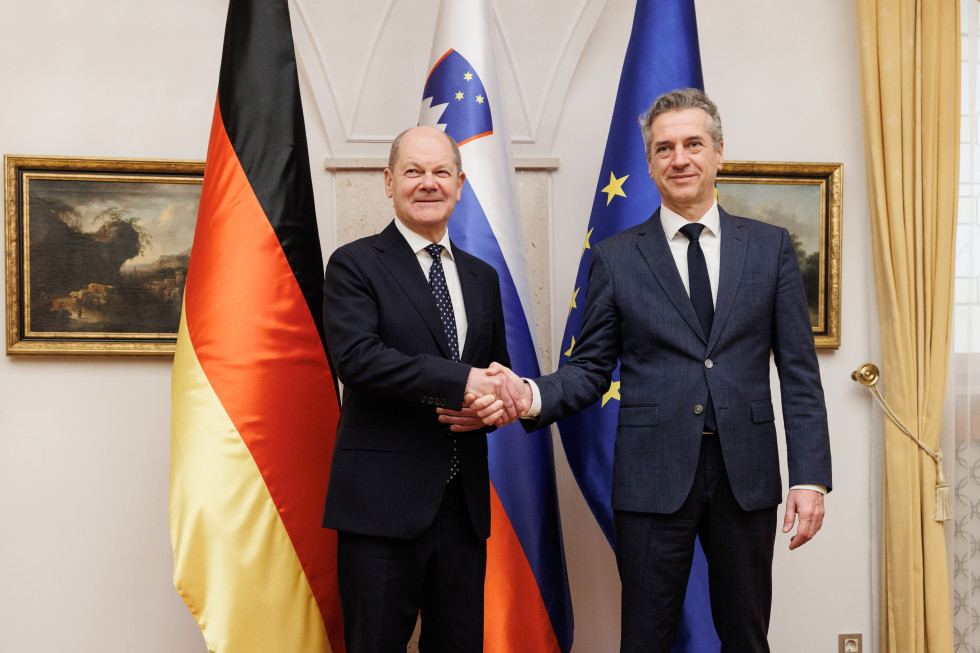Prime Minister Golob: Our cooperation with Germany is excellent in all areas

The Prime Minister of the Republic of Slovenia, Robert Golob, today hosted the Chancellor of the Federal Republic of Germany, Olaf Scholz | Author Nebojša Tejić/STA
The two highlighted the excellent cooperation between the two countries, pledged to deepen their economic and political cooperation, and touched upon the situation in the Western Balkans, Ukraine and the Middle East, with a focus on the war in Gaza. They also discussed the EU enlargement in the context of EU reform and the strategic agenda. They also discussed energy, the automotive industry and, of course, football.
Germany is one of Slovenia's most important foreign trading partners, with a trade volume of EUR 14.4 billion; it is also its fourth largest foreign direct investor (EUR 1.84 billion) and in first place in terms of tourist arrivals.
The Prime Minister, Robert Golob, pointed out that in this context this was an important visit to Slovenia by the German Federal Chancellor, the first in 13 years. "I am proud that we have not lost these 13 years, but that our ties with Germany have only been strengthened. We have excellent cooperation with Germany in all areas – in the EU, NATO and other international forums," said Prime Minister Golob. He took the opportunity to thank Chancellor Scholz "for the leading role he is playing in the processes in the European Council, as these are areas that also concern Slovenia, our security, stability and prosperity."
Prime Minister Golob underlined Germany's willingness to achieve a breakthrough on the enlargement of the European Union to the Western Balkans. "I believe that the Federal Chancellor immediately realised how important it is for these countries to become part of the European Union. The Federal Chancellor played an important role in convincing others in the EU Council and sceptical countries, for which we in the Western Balkans should all be grateful," the Prime Minister said. He added that he and the German Chancellor had discussed European and broader foreign policy issues, including the Russian aggression in Ukraine. They touched on how to help Ukraine and how to achieve peace.
Slovenia and Germany are political, economic and strategic partners, so the discussion between the Prime Minister and the Federal Chancellor focused on bilateral cooperation. "We discussed further strengthening of our cooperation in the spheres of the economy, new technologies, energy and the defence industry. I am confident that we will find a common language and new energy in supporting the economy and cooperation," said Prime Minister Golob.
The talks also touched on football, with Germany hosting the European Football Championship, in which the Slovenian national team is also participating. "During the championship, Slovenia will also be present in Germany with a business delegation. We are organising an important conference in Munich on 19 June, and I believe that this will also be an opportunity to strengthen our cooperation," added Prime Minister Golob.
German Federal Chancellor Scholz added that the two countries share similar views and challenges. "We need to tackle the energy challenges and secure a good future and to ensure growth and economic development. We need to do the work necessary to modernise the automotive industry so that we can continue to be a major player in this area in the future," said Chancellor Olaf Scholz. He also stressed the importance of deepening bilateral relations between the two countries, including in economic terms. He added that he and Prime Minister Golob had agreed on the continuation of the bilateral Action Plan. "We are now in the preparatory phase for the next Action Plan, and this is something that shows our good relations, so we will continue to work step by step in this direction," the Chancellor said. "Slovenia has been a member of the EU and NATO for 20 years, and we are very closely linked politically and security-wise. Of course, we have big challenges ahead of us."
